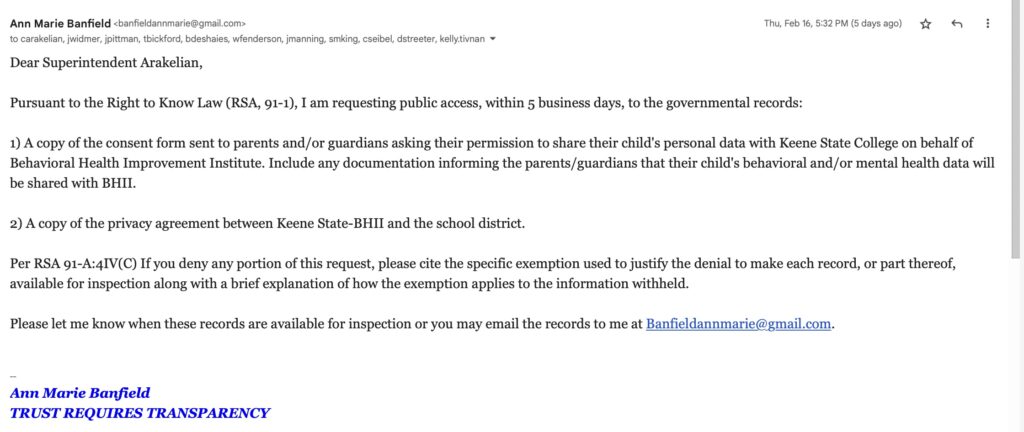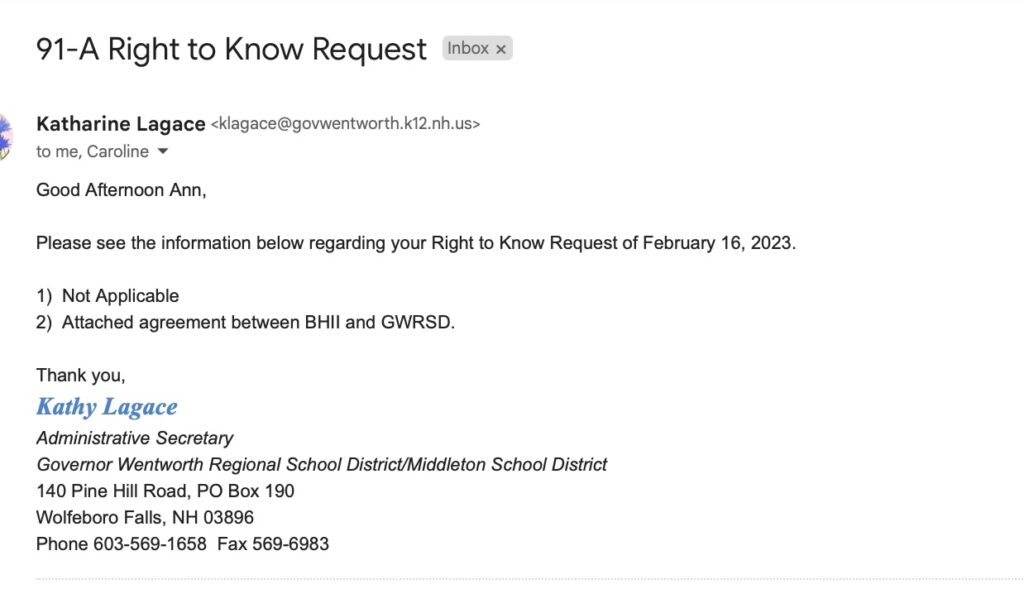After a hearing to re-fund the Multi-Tiered System of Support so that schools in New Hampshire can continue assessing, and treating the mental health of students, I sent this email to Lisa White, Director of Instruction for the NH Department of Education.
I continue to OPPOSE SB265. This expenditure directs valuable resources away from the children who need the most help.
Dear Ms. White,
After listening to your testimony (2:29:49) before the New Hampshire Senate Health and Human Services Committee, I wanted to bring some additional information to your attention. During your testimony, where you described the MTSS-B framework, you commented on how the MTSS-B system is set up. But within tier 1, you didn’t mention that this is where school districts are administering Social and Emotional Learning, oftentimes using outside vendors as their resource.
For example, I recently filed a complaint with Diana Fenton asking for an investigation in the Greenland School District. Greenland is currently using the SEL program Kimochis in the classroom. You can download that complaint and read how the Superintendent was not obtaining informed consent from parents when their children were participating in group therapy.
You will see that I included the provision in ESSA that requires parental consent when there is any kind of assessing of a child’s mental health or if they are providing mental health services. SB265 would make an appropriation for the multi-tiered system of support for children’s mental health. SEL is included in Tier 1, but school administrators are in denial that SEL has anything to do with mental health.
There is a pattern of denial among school administrators who have no education in this specialized field. That is why I always check with a Child Psychologist before addressing this matter. Whenever an outside vendor’s software is used to assess a child’s SEL, we then have the issue of personal mental health data collected, stored and possibly shared.
A New Hampshire teacher contacted me several years ago because she was using the DESSA mental health assessment on her students. She was concerned that her eight hours of training did not give her the expertise to subjectively score a child in this way. Back then, this mental health data was not only accessed using the DESSA vendor. That data was then shared with Plymouth State in order to conduct research similar to what Keene State BHII is doing now. Please note that at that time, Plymouth State referred to this as research. Keene State now calls this an “external evaluation.” (See Project Aware Attachment)
When I emailed the school administrators gathering this sensitive data on students, I found out that they did not ask for parental consent. Nor did they inform parents that the data was uploaded to an SEL vendor and then shared with Plymouth State researchers. This became so disturbing to some families who found out what was happening in our public schools. A New Hampshire Physician wrote about it in the Wall Street Journal. Some parents quietly removed their children from the public school because of the lack of transparency, refusal to follow ethical guidelines, and because administrators were ignoring federal law.
I sat down with researchers from Antioch after that. They were then tasked with collecting this sensitive mental health data in order to fulfill the federal grant requirements. Antioch also pushed the responsibility of obtaining parental consent on school officials, but school officials claimed they weren’t responsible either. It’s disturbing that those in the New Hampshire University system, who are supposed to uphold ethical guidelines on the research of children, would participate in this kind of gathering of mental health data and do nothing to ensure these important protocols and laws are followed.
Tier 1 does include mental health assessments and services when using certain SEL programs and vendors. Would all qualify as mental health? Maybe not, you managed to highlight that some of Tier 1 include academic assistance to students. However, we also know that these SEL programs, as confirmed by DESSA representatives, are used to assess and treat a child’s mental health. The DESSA was used as a Tier 1 SEL mental health assessment on students in NH schools. I’m not here to judge the validity of these programs, only to highlight that school administrators are not obtaining parental consent in many instances. (See attachment)
In addition, while I am aware that school counselors are obtaining consent from parents when students are pulled out of class, that sensitive mental health data is then shared with Keene State BHII without parental knowledge or consent. It’s the sharing of the data that requires parental consent, but that’s not happening.


We have two situations where informed consent is not provided by parents and guardians:
1) When SEL mental health assessments and programs are used in the classroom.
2) When mental health data on individual students are shared by school counselors and social workers with Keene State BHII
There are situations when counselors obtain informed consent, but there are times when parents are not consenting to the treatment, assessing, or sharing of mental health data.
Professional, ethical protocols require informed consent when researching, assessing, and treating subjects. In this case, children would need their parents or guardians to consent. Ignoring these ethical boundaries would result in forfeiture of license in the private sector. (http://www.apa.org/ethics/code/ Section 9 Assessment).
IRB approval is contingent on having a protocol which includes that the data will be stored and secured. Parents need to see how their child’s personal data has been secured, and the protocol if there is a data breach. IRB requires individuals with diminished autonomy be entitled to protection, and that individuals enter into research voluntarily with adequate information. Children do not have the capacity to make those decisions, therefore, ethically, parental consent would be required. (https://hso.research.uiowa.edu/summary-belmont-report Summary of the Belmont Report)
Requiring or asking school counselors to share this sensitive mental health data with Keene State BHII appears to violate their Code of Ethics. (See attached document under Confidentiality) I would advise parents to seek legal assistance, and ask that a school counselor’s license be revoked if they discover that their child’s information was shared without their knowledge or consent.
How does Keene State get around the IRB approval? It appears by looking at the Project Aware Grant that if they add BHII as a “data analyst” role to SWIS School Wide Information System account, they become part of the school system versus a researcher. You can also see that they refer to BHII in the grant as an outside evaluator vs. a researcher at the same time. All of this becomes a way to legally jump through hoops in order to avoid ethical guidelines, and laws to protect a child’s privacy rights. How are parents to trust in this scheme?
Whether it be by jumping through hoops to avoid informed consent, or calling mental health assessments and treatment something else, informed consent has been thwarted in other circumstances.
You talked about aggregate data that is shared with the DoE, and speculated on whether individual (PII) is shared outside the school system. Maybe you did not read the Project Aware Grant before you testified. LEAs are sharing the PII with BHII.
“Governor Wentworth, Hudson, Merrimack Valley, Raymond, Sanborn Regional, SAU 34, and White Mountains LEAs are implementation sites for this project. BHII will have access to both aggregate (e.g., school or district-level) and individual student-level data provided by each of the seven participating LEAs to support implementation and ongoing evaluation and quality improvement of the SOC 2.0 program. BHII will collect measures of the background characteristics, services and supports, experience, and outcomes of youth that enroll in Tier 2 and 3 behavioral health services. These data are collected from and shared with BHII at the individual level. In addition, office discipline referrals, suspensions, attendance rates, and academic performance will be collected at the individual level and shared with BHII. The majority of school- and student level data will be provided to BHII by SOC 2.0 stakeholders in each LEA via a cloud-based data platform developed and hosted by BHII. BHII utilizes Quickbase software for collection and storage of sensitive data.”
The SWIS system also allows BHII access to demographic information (PII) about individual students including gender, ethnicity/race, IEP/504 Plan, and disability status.
SEL vendors also collect data on children. If you take time to read their privacy policies, you will see that they are anything but private. The Family Education Rights and Privacy Act (FERPA), 20 U.S.C. §1232g, is designed to protect the privacy of students’ educational records. Regrettably, regulations were changed without Congressional authority, to allow the data mining of our children for research and development without the knowledge and consent of the parents. I believe it is important that parents are informed about this loophole in the federal regulations. Protecting children and families should be of utmost importance, particularly if children are being used as research subjects. Unfortunately this information never seems to be presented to our elected legislators. The loopholes profited Ed Tech companies at the expense of protecting this student data. In some instances, parental consent is not required by law, but in ESSA, there are times when informed consent is required. Do we need laws to uphold ethical research on children? What about the informed consent law that is ignored?
It is true that New Hampshire has some of the strictest privacy protections in place, thanks to leaders like Representative Cordelli and others–but the FERPA loophole remains a big problem for privacy rights activists. Thankfully the issue of data privacy is typically a bi-partisant issue, and has even had support from the ACLU. However, there have been times when Ed Tech lobbyists fought against the only parental rights advocate in the room, me. Data Brokers are profiting off of all of this newly attainable data, and most parents will never know it.
I hope that by sharing this information with you, you will correct your testimony in the future. All information should be provided to the Senators so that they can make informed decisions when they vote. I understand that some of the individuals testifying rely upon this funding, but even they should be forthcoming with all the facts. When I read the Keene State BHII MTSS-B Coaching, Technical Assistance, and Evaluation Update, it looked more like a marketing brochure than a peer-reviewed and independent study on MTSS-B.
Your testimony included a statement about hiring more interventionists at the DoE. Others, like me, were focused on stopping the hemorrhaging that occurs on a daily basis as children sit in hospitals for sometimes a week at a time, waiting to get into the one mental health facility in New Hampshire. The Senators will have to determine if this money is better spent on more bureaucrats working for the DoE or possibly helping children in crisis.
I don’t agree that schools should be awarded any of this money if the administrators are going to ignore federal laws, ethical guidelines, and risk their counselors’ license. If this program works well, then a child’s privacy rights, and the rights of the parents must be prioritized. I would hope that someone in your position would uphold the highest level of ethics, and demand better from those who seek to provide mental health services in our schools.
Please reference all attachments.
Ann Marie Banfield
TRUST REQUIRES TRANSPARENCY
